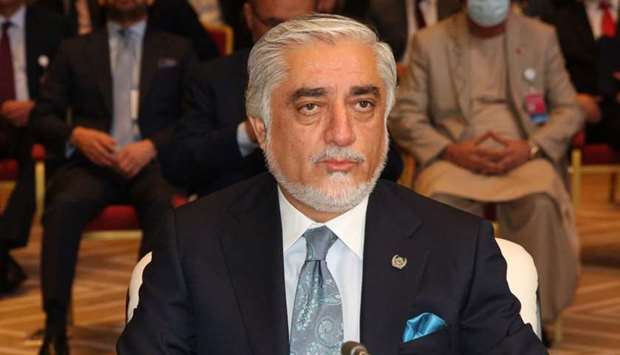The Chairman of the High Council for National Reconciliation of Afghanistan (HCNR), Dr Abdullah Abdullah, praised the role of Qatar and its keenness to bring peace to his country and its efforts to organise the current round of negotiations, and the keenness of all parties participating in the negotiations to reach a lasting peace and stop the bloodshed.
Dr Abdullah Abdullah affirmed, during his speech at the opening ceremony of the Afghan Peace Negotiations that began on Saturday in Doha, that all those involved in the negotiations are full of good intentions to stop the bloodshed and reach a permanent and just agreement, especially since the legitimate demands of the Afghan people call for an end to war and suffering and the enjoyment of comprehensive peace and order, based on the supremacy of the constitution and what achieves stability.
He pointed out that reaching a lasting and dignified peace can be achieved when the will and sincere intentions of the participants in these negotiations are available, and that they are responsible before God to respect the free will of the people, respect its aspirations and hopes to stop killing and destruction in the country, to reach peace and not to lose this opportunity.
He reviewed the efforts made to cease fire and bring peace to his country - which come from a religious and historical standpoint - including the establishment of the House of Elders to build a national consensus, the holding of local and international conferences to end the war, the establishment of the High Council for National Reconciliation, and the formation of the negotiation team.
He also reviewed the sacrifices made by the Afghan leaders, politicians and people in their march to stop violence and reach peace, indicating that more than 12,000 Afghans have died and more than 15,000 have been injured.
He warned that with the achievement of permanent peace and the establishment of a comprehensive system that preserves the rights of all, "women, minorities, and war victims", the negotiating parties would be heroes, and if reconciliation extended, the people's suffering would end and lasting peace would inevitably be achieved.
He added that all participants represent a political system that enjoys the support of millions of women and of various political and ethnic backgrounds in the country, and all want to close the door to war and open the door and prospects for peace that have exceeded so that harmony be achieved among all spectrums of Afghan people.
He pointed out that all share a spirit of sincerity and goodwill to achieve reconciliation, wishing to unite the people under one roof after 42 years of violence, and participants must seize the precious opportunity to move forward to a better future.
Dr Abdullah Abdullah expressed his confidence that achieving peace in Afghanistan provides prosperity and stability and helps to address any local, regional or international threats. It can also pave the way for the return of millions of refugees who have spent long years facing difficulties to integrate with the rest of the people, reminding at the same time the efforts of leaders and politicians in reaching peaceful solutions, and the failures they have suffered because of the surrounding circumstances which are beyond their control.
He stressed that today is an opportunity to stop the war and move forward to achieve peace and consensus, reach common ground and discuss issues of concern to the people, expressing his confidence in the ability of participants to take steps towards peace and national reconciliation.
He pointed out that it is not important to agree on all points, but rather to adopt basic and fundamental steps, reach points of convergence, suggest alternatives, and adopt a comprehensive and inclusive agenda that leads to reconciliation and settlement acceptable to the people.
Dr Abdullah Abdullah stated that issues of the constitution, elections, freedom of expression, women's and minority rights, the rule of law, democracy and civil and political rights are among the most prominent achievements that must be built upon, pointing out the importance of preserving and supporting infrastructure projects and national institutions, including security that have been restored during the past 19 years.
He warned against going back and making Afghanistan a haven for terrorist groups, stressing the keenness of the Afghan people to improve economic prospects and combat poverty and unemployment rooted in the region by promoting investments and providing foundations for peace within the country and with neighbouring countries, calling on all countries to help establish, consolidate and maintain peace.
He expressed his thanks and gratitude to the host country, Qatar, and all the international partners who have stood by the Afghan people over the past years to restore peace to the region.

